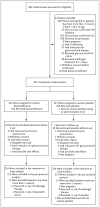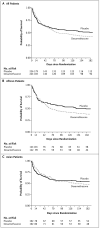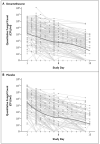Adjunctive Dexamethasone in HIV-Associated Cryptococcal Meningitis
- PMID: 26863355
- PMCID: PMC4778268
- DOI: 10.1056/NEJMoa1509024
Adjunctive Dexamethasone in HIV-Associated Cryptococcal Meningitis
Abstract
Background: Cryptococcal meningitis associated with human immunodeficiency virus (HIV) infection causes more than 600,000 deaths each year worldwide. Treatment has changed little in 20 years, and there are no imminent new anticryptococcal agents. The use of adjuvant glucocorticoids reduces mortality among patients with other forms of meningitis in some populations, but their use is untested in patients with cryptococcal meningitis.
Methods: In this double-blind, randomized, placebo-controlled trial, we recruited adult patients with HIV-associated cryptococcal meningitis in Vietnam, Thailand, Indonesia, Laos, Uganda, and Malawi. All the patients received either dexamethasone or placebo for 6 weeks, along with combination antifungal therapy with amphotericin B and fluconazole.
Results: The trial was stopped for safety reasons after the enrollment of 451 patients. Mortality was 47% in the dexamethasone group and 41% in the placebo group by 10 weeks (hazard ratio in the dexamethasone group, 1.11; 95% confidence interval [CI], 0.84 to 1.47; P=0.45) and 57% and 49%, respectively, by 6 months (hazard ratio, 1.18; 95% CI, 0.91 to 1.53; P=0.20). The percentage of patients with disability at 10 weeks was higher in the dexamethasone group than in the placebo group, with 13% versus 25% having a prespecified good outcome (odds ratio, 0.42; 95% CI, 0.25 to 0.69; P<0.001). Clinical adverse events were more common in the dexamethasone group than in the placebo group (667 vs. 494 events, P=0.01), with more patients in the dexamethasone group having grade 3 or 4 infection (48 vs. 25 patients, P=0.003), renal events (22 vs. 7, P=0.004), and cardiac events (8 vs. 0, P=0.004). Fungal clearance in cerebrospinal fluid was slower in the dexamethasone group. Results were consistent across Asian and African sites.
Conclusions: Dexamethasone did not reduce mortality among patients with HIV-associated cryptococcal meningitis and was associated with more adverse events and disability than was placebo. (Funded by the United Kingdom Department for International Development and others through the Joint Global Health Trials program; Current Controlled Trials number, ISRCTN59144167.).
Figures



Comment in
-
Dexamethasone in Cryptococcal Meningitis.N Engl J Med. 2016 Jul 14;375(2):189-90. doi: 10.1056/NEJMc1605205. N Engl J Med. 2016. PMID: 27410934 No abstract available.
-
Dexamethasone in Cryptococcal Meningitis.N Engl J Med. 2016 Jul 14;375(2):188. doi: 10.1056/NEJMc1605205. N Engl J Med. 2016. PMID: 27410935 Free PMC article. No abstract available.
-
Dexamethasone in Cryptococcal Meningitis.N Engl J Med. 2016 Jul 14;375(2):189. doi: 10.1056/NEJMc1605205. N Engl J Med. 2016. PMID: 27410936 No abstract available.
-
Dexamethasone in Cryptococcal Meningitis.N Engl J Med. 2016 Jul 14;375(2):189. doi: 10.1056/NEJMc1605205. N Engl J Med. 2016. PMID: 27410937 No abstract available.
References
-
- Park BJ, Wannemuehler KA, Marston BJ, Govender N, Pappas PG, Chiller TM. Estimation of the current global burden of cryptococcal meningitis among persons living with HIV/AIDS. AIDS. 2009;23:525–30. - PubMed
-
- van der Horst CM, Saag MS, Cloud GA, et al. Treatment of cryptococcal meningitis associated with the acquired immunodeficiency syndrome. N Engl J Med. 1997;337:15–21. - PubMed
-
- de Gans J, van de Beek D. Dexamethasone in adults with bacterial meningitis. N Engl J Med. 2002;347:1549–56. - PubMed
-
- Nguyen THM, Tran THC, Thwaites G, et al. Dexamethasone in Vietnamese adolescents and adults with bacterial meningitis. N Engl J Med. 2007;357:2431–40. - PubMed
Publication types
MeSH terms
Substances
Associated data
Grants and funding
LinkOut - more resources
Full Text Sources
Other Literature Sources
Medical
